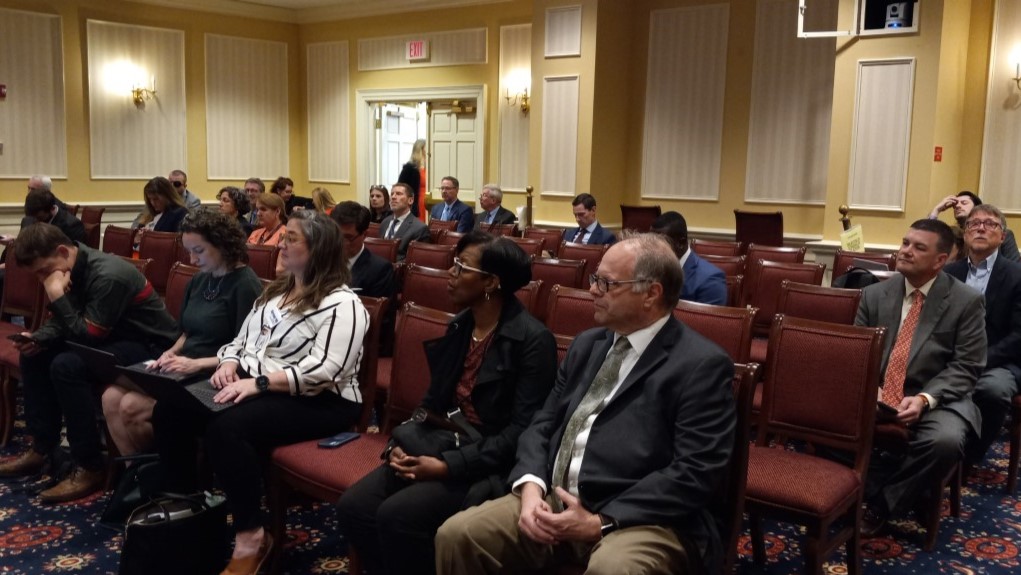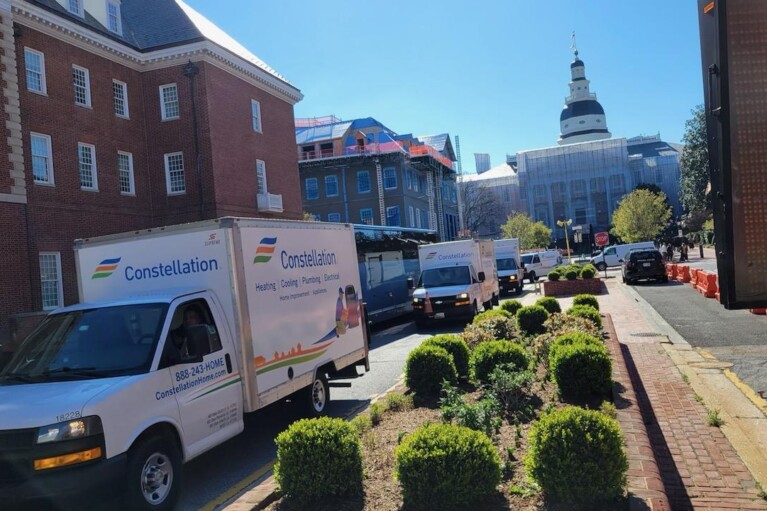Beware the invisible hand: Senate panel pulls plug on climate bill quietly opposed by utilities

During the final hours of a General Assembly session, bills can die in many ways.
They can collapse under their own weight. They can fail because lawmakers simply don’t have the time to complete the work, or grasp complex issues. Or sometimes there is an invisible hand pushing the bill toward the abyss.
The death certificate for a complex bill that would have changed an energy savings program the state’s housing agency runs would have cited all three as the cause of death. Time of death was approximately 4 p.m. Monday in the Senate Committee on Education, Energy and the Environment (EEE).
The House sponsor of the bill, Del. C.T. Wilson (D-Charles), the chair of the House Economic Matters Committee, sees electric utilities as the culprits.
The measure was meant to modernize the state’s EmPOWER program, which has required utilities and the Maryland Department of Housing and Community Development to offer energy conservation grants to households throughout the state. The state housing agency is charged with running the program for low-income residents.
Since its inception in 2008, EmPOWER has saved ratepayers more than $4 billion on energy bills, according to state estimates, and reduced greenhouse gas emissions by the equivalent of 9.6 million metric tons of carbon dioxide — the equivalent of moving 2 million cars off the road.
The bill under consideration was designed to expand the scope of the program, requiring annual goals for greenhouse gas emissions reductions while adding consumer protections to smooth the transition to clean energy and keep electric bills from increasing dramatically.
“This bill would have generated important benefits by using EmPOWER to help us meet our state’s critical climate goals while benefiting Marylanders by bringing down their energy usage and bills,” said Josh Tulkin, the director of the Sierra Club Maryland Chapter.
Because EmPOWER runs in three-year cycles, this was a particularly good time to update the program, bill supporters said, because a three-year cycle is ending this year.
Two powerful lawmakers sponsored the bill initially: Wilson and Sen. Brian J. Feldman (D-Montgomery), chair of the EEE panel. But the focus of lawmakers and advocates over the past several days was on the House bill.
Last week, the House panel’s Public Utilities Subcommittee, chaired by Del. Brian M. Crosby (D-St. Mary’s), added some critical amendments to the bill that strengthened consumer protections. It passed in the House on a 100-37 party-line vote on Wednesday. Utilities, according to several people following the legislation, were not happy.
The amended bill did not make it to the EEE committee until Monday morning, the final day of the 90-day legislative session. Even though the senators had held a hearing on Feldman’s bill on March 14, they seemed unprepared to absorb the changes the House made to the legislation.
“It’s an important bill,” Feldman told his colleagues. “Unfortunately, we got it very late. But that can’t be helped at this point.”
The panel spent about half an hour discussing the legislation before the Senate’s first floor session of the day, which began at 11 a.m. Two dozen lobbyists and state officials sat and watched — including half a dozen lobbyists from BG&E alone.
The initial discussion focused mainly on the financing of the program, which is almost impossible to understand and explain. The Maryland Public Service Commission (PSC), which regulates utilities in the state, has allowed the utilities to finance the program and recover costs, with interest, from ratepayers under an amortization plan that spreads payments out over five years. But consumer advocates have criticized the program’s current funding mechanism, and say it has led to unreasonably high profits for the utilities.
By 2020, the utilities had accumulated over $800 million in unamortized program expenses — costs that Maryland ratepayers have to absorb.
In December, the PSC issued an order to pay down the amortized balance and shift to an annual financing model to limit costs. The legislation would have extended the payback period ordered by the PSC by two years, from 2029 to 2031, and lowered the interest rate to lessen the ratepayer impacts.
“It’s kind of like chemotherapy,” said Sen. Benjamin Brooks (D-Baltimore County), a member of EEE. “You’re going to feel worse before you feel better.”
But the concepts were clearly eluding some of the committee members.
“I’m finding this really complex, as I’m sure it is to other people,” said Sen. Mary Beth Carozza (R-Lower Shore). She noted that until this legislative session, utility regulation had largely been the purview of the Senate Finance Committee. “It’s a new topic for this committee.”
Feldman advised his colleagues that they would tackle the legislation again after the first Senate floor session.
“We need to make an assessment and we’ll do the best we can,” he told Maryland Matters.
‘I kind of feel like I’m in over my head’
When the hearing ended, representatives from the PSC huddled with consumer advocates and other energy industry lobbyists.
The panel reconvened around 3 p.m., whipped through a few minor bills, and then asked representatives of the PSC and the Office of People’s Counsel, which represents consumers on utility issues, for their views of the amended EmPOWER bill. The conversation, if anything, may have confused lawmakers even more.
“I kind of feel like I’m in over my head,” said Sen. Katie Fry Hester (D-Howard), one of the more bookish members of the panel. “This bill is like 50 pages long. I don’t even know what this bill does anymore.”
Sen. Malcolm Augustine (D-Prince George’s), who had been urging his colleagues to move swiftly through the bill, begin to explain what the term “demand response” means in utility regulation.
But it was clear the committee’s will was flagging.
“Does anything bad happen in the state of Maryland if we don’t pass this?” Sen. Cheryl C. Kagan (D-Montgomery), the EEE vice chair wondered.
“The program continues,” Augustine replied. “The [PSC] order is in place.”
Sen. Karen Lewis Young (D-Frederick) said she was reluctant to abandon the effort.
“I don’t know if I’m comfortable with the consequences of what happens if we don’t do anything now,” she said.
Feldman decided to pull the plug.
“I don’t think one day is enough to contemplate this,” he said. “It feels kind of sloppy.”
Feldman said the committee could have done a thorough job examining the legislation if it had been introduced early in the session, “not on April 10.”
And that was that. Several utility lobbyists gathered in the hallway outside the committee room and talked quietly among themselves. It seemed to epitomize the axiom in Annapolis that the best lobbyists are deployed at strategic times to kill complex legislation.
Environmentalists and consumer advocates looked stunned.
“This is a huge missed opportunity,” said Tulkin of the Sierra Club.
“Unfortunately, ratepayers are going to have to wait at least another year for these added benefits and protections,” said Emily Scarr, state director for Maryland PIRG, the public interest organization.
Informed by a reporter about the Senate panel’s decision, Wilson, the House sponsor, expressed surprise and disappointment, saying his committee had informed their Senate counterparts that the proposed changes were afoot.
“It’s not that big of a lift, it’s an important lift,” he said. “It wasn’t as complex as everyone thought.”
Wilson blamed the utilities for the demise of the legislation, saying they “did a phenomenal job of confusing the issue and muddying the waters.”
Wilson noted that while the legislative session was in its final hours, “I have a long memory.”
Crosby, in an interview, said he was disappointed but not altogether surprised.
“We put out a solid product,” he said. “I didn’t think it was that complicated. We’ll be back next year.”
This story was updated at 10 a.m. on April 11 to clarify details about the EmPOWER program.




 Creative Commons Attribution
Creative Commons Attribution